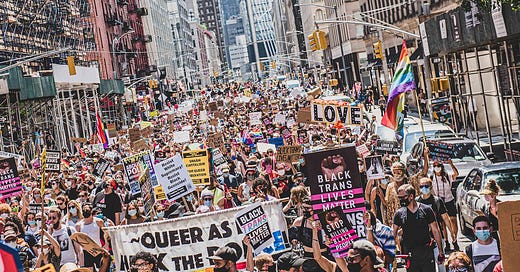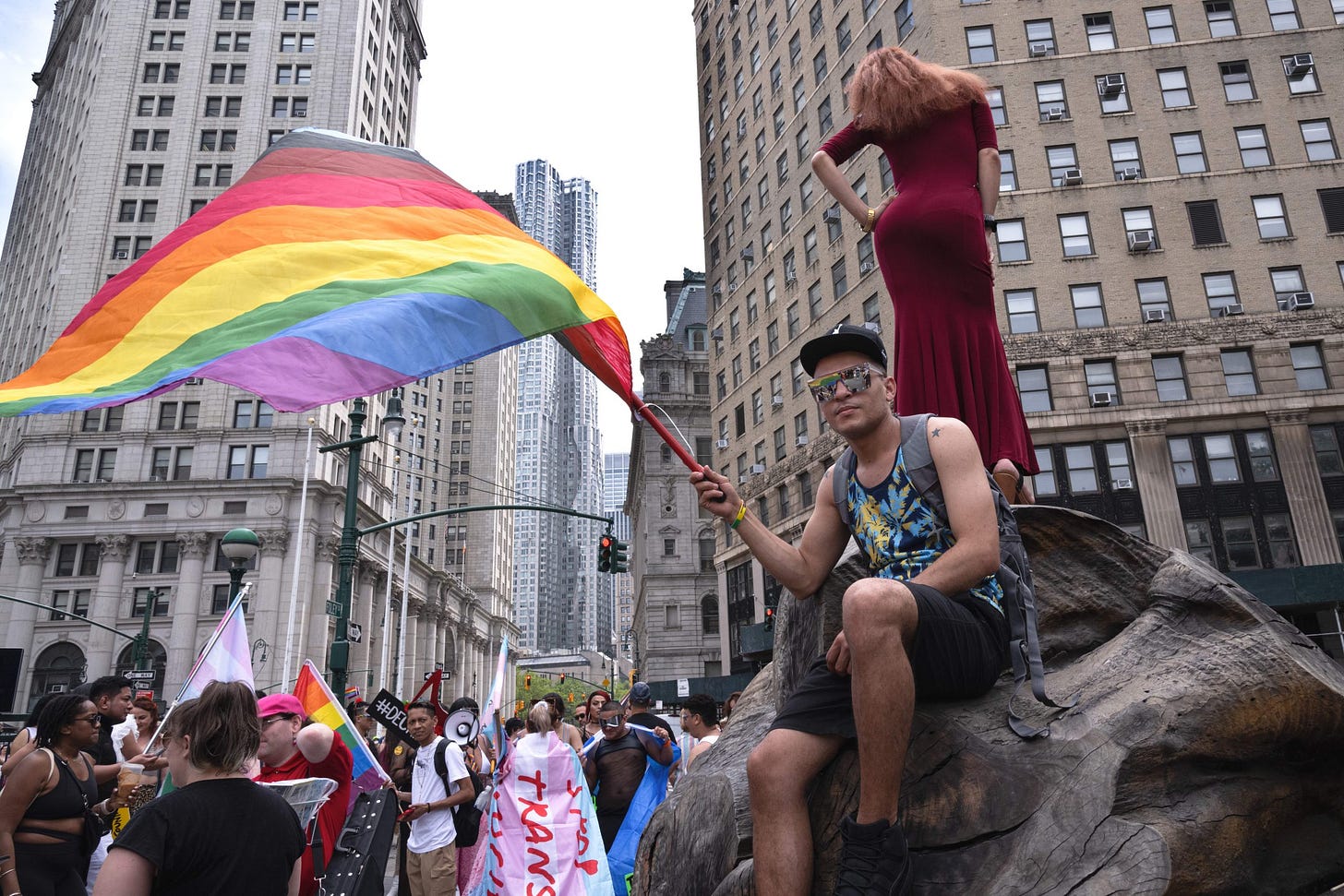The Queer Liberation March was founded in 2019 during the first Trump administration to bring back the spirit of militancy that spurred the original Stonewall Riots that launched the gay rights movement. Unlike the more mainstream NYC Pride March, QLM rejected corporate sponsorships and the presence of cops within their ranks. With Trump and the MAGA movement back in control of the White House as Pride month begins, this year's march could be the largest one to date. “We’re back to basics, in terms of our organizing,” said one QLM organizer. “We’re a march; we’re not a parade.”
As Corporate Sponsorships Dwindle, Queer Liberation Marches On
By Eva Moschitto
The NYC Pride March began in 1970, one year after the Stonewall uprising that launched the gay rights movement. The annual Pride March, on the last Sunday in June, is dotted with the floats of corporate sponsors and attracts hundreds of thousands of onlookers. Heritage of Pride, the organization that runs it, is now a 501(c)3 nonprofit with a $4.6 million operating budget, 70% of which goes toward producing Pride month events, spokesperson Kevin Kilbride told The Indypendent in an email.
The Reclaim Pride Coalition was founded in the spring of 2019 by people who felt NYC Pride was marginalizing more radical members of the LGBTQ+ community. They were uncomfortable with NYC Pride’s cozy ties with corporate sponsors and the city police department, whose raids on gay bars in Greenwich Village sparked the 1969 Stonewall uprising. Since 2019, Reclaim Pride’s Queer Liberation March has attracted 40,000 to 50,000 marchers each year, according to organizers.
With the LGBTQ+ community under withering assault from the Trump administration, the two groups will march on the same day this year, Sunday, June 29. The NYC Pride March will travel its traditional route down Fifth Avenue, west on Christopher Street, and then up Seventh Avenue to West 15th Street. The Queer Liberation March has not yet announced this year’s route.
NYC Pride, like various other Pride celebrations around the country, is re-evaluating its budget as corporations reduce or revoke the financial support they previously provided.
“At this point, we are anticipating a loss of roughly $350,000 in corporate support, which means we may need to scale down the footprint of our Pride month events and year-round programming. It also impacts our ability to award grants to local queer nonprofits through our ‘Pride Gives Back’ grant program,” Kilbride said.
He declined to name companies that had revoked sponsorship. “Many of them are longtime partners, and we’re honoring that history as we work to keep them at the table in the spirit of showing up for the LGBTQIA+ community down the line,” he said.
According to Kilbride, corporations cited economic concerns regarding tariffs and fear of retaliation as reasons why they revoked their support.
“We’ve been heartened to see some partners provide funding without any marketing behind it,” he noted. “With our current funding model, corporate partners remain essential for us to keep our events free and accessible to the entire LGBTQIA+ community in New York City and beyond,” he said.
• • •
The Queer Liberation March is planned and executed by a fully volunteer staff and relies on donations from foundations and individuals to cover operating costs.
“We’re back to basics, in terms of our organizing,” Reclaim Pride cofounder Jay W. Walker said. “We’re a march; we’re not a parade.”
For safety, the march relies on trained community marshals. It has never accepted a police presence or barricades. “We do not want a police presence at our march and for the most part, [the NYPD] goes along with that,” Walker said. “We are not a welcoming space for police to march armed, in uniform,” referring to a practice NYC Pride discontinued in 2021 after intense criticism.
Lesbian, gay, bisexual, and queer people were roughly six times more likely to be stopped by police in a public space, a 2021 study by the University of California at Los Angeles law school’s Williams Institute estimated (the study did not survey transgender people).
This year’s theme for the Queer Liberation March will be “Resist! Reclaim! Rejoice!”
“It would be impossible to encapsulate the overwhelming level of attacks on LGBTQ2S+ communities happening in the United States and around the world right now, as well as just to human beings — to human rights and civil rights both here and abroad,” Walker stressed. “We have to resist what’s happening now so that we can reclaim our freedoms and our liberty, so that at the end of this all, we’ll be able to rejoice.”
The theme in 2022, the year the Supreme Court ruled that states could outlaw abortion, was “For Trans and BIPoC Freedom, Reproductive Justice, and Bodily Autonomy.” In 2024, it was “For Black, Brown, Queer, Trans, Gender Nonconforming, and Nonbinary Youth, and Against War and Genocide.”
Those issues “are always going to be a part of it, because [they] are ongoing,” Walker noted.
This year’s theme was decided through several town hall meetings that were largely unpublicized. “We didn’t want this to be a media event,” Walker said. “We wanted this to be a space where people could have unguarded conversations [about] how they felt our collective communities needed to respond to this.”
Reclaim Pride was founded during the first Trump administration. Walker says all the hard work done since then is paying off now.
“Those four years gave us some architecture, some infrastructure, to start with,” he said. By this year, “We had the connections between organizations, between individuals, the friendships, the comradery. … in many ways, we are in a better position to resist, because all of that connective tissue is already there.”
The theme for this year’s NYC Pride March is “Rise Up: Pride in Protest,” in honor of the first Pride march in 1970. “We felt it was necessary to help meet this volatile political moment, serving as a call to action for our community and allies to join us and march in defiant celebration, advocacy and solidarity,” Kilbride said.
To Walker, the moment is more than volatile; it’s “a tipping point.”
“The stressors that this global authoritarian fascist movement is putting on ordinary people all over the globe — there’s going to be a reaction,” he said. “There is a societal hunger in this country to stand up. The Queer Liberation March is going to be a part of that larger movement of coordinated protests happening all over the country.”
Yes, I want to support The Indypendent!
Click here to see “We’re Here, We’re Queer, We’re Unionized,” Eva Moschitto’s coverage of the successful union drive at The LGBTQ+ Center that was sparked by staff organizing in support of Palestinian liberation.
Indy Time Machine: Past coverage of the Queer Liberation March
Queer Liberation March is Both the Past and the Future of Pride
By Elsie Carson-Holt
June 2023
No Cops, No Sponsors: 50 Years After Stonewall, Pride Goes Back to Its Roots
By Emma Gaffney
June 2019
Reclaiming the Revolutionary Spirit of Stonewall at the Queer Liberation March
By Emma Gaffney
July 2019





4.6 million annual budget, 70% of which goes to pride month events. They expect just a $350K dip in this year’s sponsorships, and they choose to take that out of the budget to queer nonprofit donations?! Nope. That’s not solidarity, that is greed.